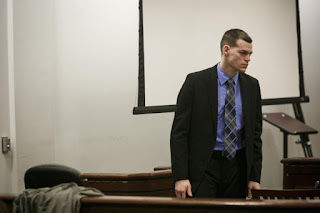Jury finds Chesapeake Virginia security guard guilty of murder

CHESAPEAKE VA March 2 2019
A jury found a security guard guilty of second-degree murder Friday, rejecting his claim of self-defense in the fatal shooting of a 60-year-old man in his minivan in 2017.
Johnathan Cromwell was charged with first-degree murder in the death of Jiansheng Chen, but jurors convicted him of a lesser charge.
The jury deliberated for more than 10 hours over two days before reaching a verdict on the ninth day of trial in Circuit Court.
Jurors will return to court Monday to begin considering what sentence to recommend. Cromwell faces up to 45 years in prison.
Prosecutors, Chen’s family and Cromwell’s attorney all declined to comment after the verdict Friday, saying they would speak to the press after the sentencing next week.
Chen was shot shortly after 11 p.m. on Jan. 26, 2017, after he turned his minivan into the driveway of the Riverwalk Clubhouse parking area in the 700 block of River Walk Parkway.
Chen, who lived at his brother’s house in River Walk, was shot once in the upper left arm and four times in the chest. Prosecutors say he was playing “Pokemon Go” on his phone that night.
Cromwell had worked for Citywide Protection Services for about two months at the time, and his attorney argued he fired his 9 mm pistol in self-defense.
“I shot because I felt like he was going to run me over,” Cromwell testified Tuesday.
In his closing argument this week, prosecutor D.J. Hansen said Cromwell made the “cold” and “calculated” decision to confront Chen, then fired 10 times, first into the side window and then into the front of the van.
Hansen said Chen did nothing wrong and Cromwell had no reason to approach him, but provoked a confrontation because he didn’t want Chen to leave.
Hansen told jurors broken glass was on the pavement under the shot-out driver’s-side and back windows, proving the van wasn’t moving when Cromwell opened fire.
Cromwell told a homicide detective that Chen’s foot was on the brake when he approached after the shooting. Hansen questioned how the van could be in motion if Chen’s foot was on the brake.
Cromwell told the detective he told Chen “stop” 10 to 15 times before he fired. He also said Chen shook his head “no.” Hansen played security camera footage from neighbor’s house, in which Cromwell can be heard saying “stop” three times before firing.
Hansen said Cromwell had a “fascination with police.” But Cromwell was not a police officer, the prosecutor said, and had limited arrest powers.
In his closing argument, defense attorney Andrew Sacks said his client was faced with a 4,700-pound “mass of metal” coming at him and made a split-second decision in order to save his life.
“He fired because he believed he had to, not because he wanted to,” Sacks said.
A registered, armed security guard, Cromwell approached Chen’s van because it was after hours, Cromwell found it “suspicious,” and it was his job to investigate, Sacks said. Cromwell had the authority to make an arrest if necessary, he said.
Sacks rejected prosecutors’ position that Cromwell moved from the side of the van to the front. He said shots could be heard fired in “rapid succession” in the security footage. Instead, Sacks said Chen’s van was moving, exposing the driver’s side.
After he was interviewed by a detective at the scene, Cromwell asked about the “grouping” of his shots, referring to the pattern of gunfire. Sacks said prosecutors took the question out of context and that Cromwell asked because he was concerned about stray bullets. Cromwell prefaced the question by telling the detective not to take the inquiry the “wrong way,” Sacks said.



